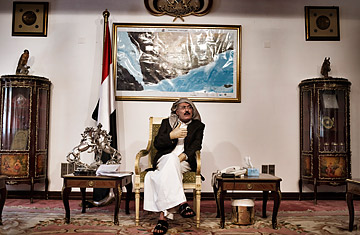
Yemen's President Ali Abdullah Saleh speaks with TIME and the Washington Post in Sana'a on Sept. 29, 2011
TIME/Washington Post: We would like to inquire about your health. Do you have any indications of who might have been behind the terrorist attack that nearly killed you on June 2?
Thank you for asking about my health. About the incident, there has been an exchange of information between us and the United States [since the attack]. And they promised us they would analyze the subject at the end of September. So we are still waiting for the analysis from Washington.
You have authorized your deputy, Abdu Rabbo Mansour Al-Hadi, to sign the GCC initiative [a transfer-of-power plan crafted by Yemen's Gulf neighbors]. Why don't you do it yourself now that you are here? And if you could explain to me what is holding up the agreement, and how close is the government to signing it?
First of all, the Vice President was delegated according to a republican declaration (a declaration by the President). And there isn't any reason for it not to go through, whether I am inside the country or outside. There is nothing that would stop this declaration from going through.
How close is the Vice President to signing the agreement?
The VP is waiting for the other side. We are ready for signing the GCC initiative as it is. However, the JMP [opposition coalition Joint Meeting Parties], they say that they want from this initiative one point: that the President, or the Vice President, signs, and within 30 days [the President] leaves power. And then the 60 days that the GCC have mentioned — they are not enough for elections. What is important to [the JMP] is to remove the President from power, and the country would then go through chaos.
We are ready and willing to sign at any time. But we need to sign the GCC initiative as a whole, and we need timelines for the mechanism of executing it ... We are not holding on to power. We are willing to leave power as stated in the agreement, within the days and hours that will be agreed upon.
Yet many say you are stalling. Three times you have offered to sign only to back down at the last minute. Many in the international community think that you are buying time in order to consolidate power. What makes your commitment this time different?
This is a misunderstanding. We are willing within the next hours and next days to sign it, if the JMP comes closer [to reaching an agreement]. We don't want to prolong it. And we don't want this crisis to continue. We want this country to get out of this crisis. So the wrong ideas and wrong interpretations of the media have no validity whatsoever because the transfer of power is a given, whether sooner or later.
And you are still committed to not running again when there are elections?
[Laughs.] As for me, I will retire. After the opposition contributed to make the President come closer to retirement through the criminal act that happened at the presidential mosque.
In recent days there has been heavy public criticism of you by General Ali Mohsen as well as the Ahmar clan. What is your response to this public criticism, and given the violence and mistrust that is unfolding, is it possible for all of you to remain in Yemen and work together?
What kind of criticism?
General Ali Mohsen put out a statement just the other day saying that you were driving the country to civil war.
They say such statements every day. They are the ones who attack the military bases, the civilians and the protesters — the protesters that are moving around the city with the protection of Ali Mohsen and the Ahmars, using armed people. And they assassinate protesters from behind so they can blame the state. And I believe that the American intelligence is following this up and having a close eye on it, and they know exactly what is going on.
